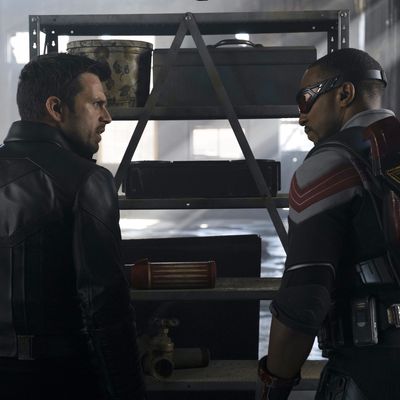
In the opening moments of the first episode of The Falcon and the Winter Soldier, Sam Wilson, otherwise known as the Falcon, is instructed to stop a hijacking-in-progress on behalf of the U.S. military without making it obvious that the U.S. military is involved.
“Sam,” a commander tells him, “this has to be subtle.”
“Subtle,” Sam responds. “Got it.” Then he jumps backward out of a plane, sprouts his Falcon wings, and gets involved in an extended, high-in-the-sky battle involving multiple skydiving terrorists, exploding helicopters, and midair headbutting. Nothing about that action sequence is subtle, and its lack of subtlety is Marvel’s way of telegraphing that, with this second Disney+ television addition to the Marvel Cinematic Universe, no expense, visual effect, or daring stunt work will be spared.
Although this was already clear after WandaVision, The Falcon and the Winter Soldier, created by head writer Malcolm Spellman (Empire), offers further proof that Marvel Studios is treating its television shows exactly the way it treats its films in terms of scope and ambition. Disney+ provided only this single first episode to critics, so it’s hard to say how well the series succeeds as an overall piece of storytelling, but even if you think the constant flow of Marvel content into the mainstream cultural pipeline has gotten a bit overwhelming — the sixth and final episode of Falcon and the Winter Soldier drops on April 23, then, after a week off, the movie Black Widow arrives on May 7 — it’s hard to deny that it produces consistently solid, entertaining work.
Compared with WandaVision, probably the most experimental MCU work to date, Falcon and the Winter Soldier is definitely more traditional Marvel fare, but it kicks into gear so quickly that this feels like less of a letdown than it might have been. Like WandaVision, this series grapples with life in the aftermath of the Blip, when one-half of humanity wakes up from a five-year nap caused by Thanos’s snap. While Wanda Maximoff reacts by creating a fake suburbia to escape reality, Sam Wilson, played by Anthony Mackie, is jetting around the world on military missions and frequently stopping back home to Delacroix, Louisiana, where his sister, Sarah (Adepero Oduye), is trying to raise two boys and keep the inherited family business running. Turns out that when millions of people disappear for half a decade, it can really mess up the economy.
As the series begins, Sam is wrestling with his responsibilities in both these aspects of his life as well as the discomfort that comes with essentially trying to become some new version of Captain America, the role once assumed by his old friend Steve Rogers. At one point, Sam puts away the familiar red, white, and blue shield that Steve had passed on to him, and he hears dialogue previously uttered in Avengers: Endgame ringing in his ears. “How does it feel?” he remembers Steve asking him as Sam held that iconic object. “Like it’s someone else’s,” Sam replied at the time. The implication of that moment and others in this first episode suggests that, as a Black man, Sam will spend much of this season struggling with representing a country in which he is still not regarded as fully equal.
Elsewhere, Bucky Barnes (Sebastian Stan), formerly known as the brainwashed assassin the Winter Soldier, is grappling with PTSD brought on by memories of the atrocities he committed pre-Blip. Like Sam, he’s trying to put his life back together. He’s also trying to atone. In this first episode, we learn he has befriended a Japanese man who lost a son, and we watch him go on a date with Leah (Miki Ishikawa), a Japanese American woman who starts to crack open the source of some of Bucky’s trauma. Although The Falcon and the Winter Soldier does not explicitly convey this, given Bucky’s status as a World War II veteran, his relationship with these characters feels like a form of amends-making for the way Japanese people were treated in the U.S. during that era. If that is indeed what Spellman and Kari Skogland, the director of the series, intend to impart, it couldn’t possibly have come at a more opportune moment given the recent increase in violence directed at Asian Americans.
There are other shades of contemporary politics in The Falcon and the Winter Soldier. The existential threat that seems destined to bring Sam and Bucky together in common purpose comes from a group called the Flag Smashers, whose beliefs don’t differ that much from certain current extreme conspiracy-theorizing movements. For example, the Flag Smashers believe that life was better pre-Blip and that Steve Rogers may still be alive somewhere in the universe. (Maybe he’s hanging out with JFK Jr.?) “Every time something gets better for one group, it gets worse for another,” Sam notes in the kind of just-vague-enough piece of Marvel dialogue that can, and surely will, be cited as evidence of the project’s timeliness. Even the flashbacks to Bucky in his Winter Soldier gear, complete with face mask, seem weirdly fresh even though those images come from several Marvel movies ago. The Winter Soldier: proof that even cold and deadly assassins can follow CDC guidelines.
Whether The Falcon and the Winter Soldier has something meaningful to say from a political standpoint remains to be seen. What is clear, one episode in, is that Skogland directs with skill and polish and that Mackie and Stan are instantly comfortable sliding back into these roles they already know so well. In short, this series seems poised to keep Marvel fans engaged for exactly the amount of time it will take for the next Marvel tentpole to come along, just as the Lord of Marvel Studios, Kevin Feige, intends.


